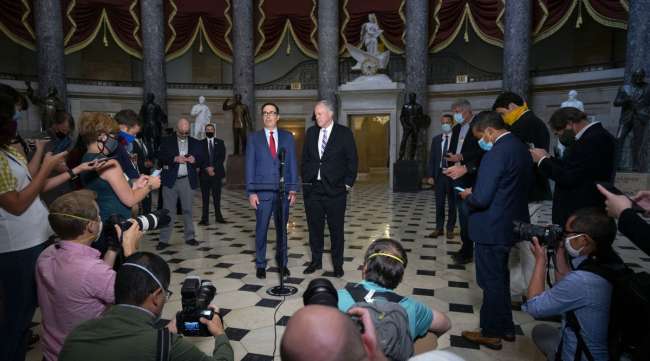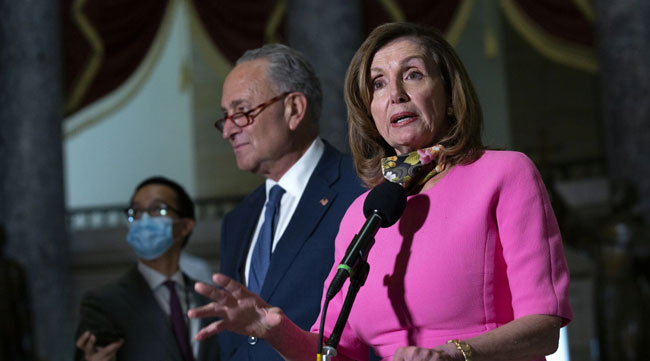Bloomberg News
Trump’s Executive Actions Fail to Jolt Stalled Relief Talks

[Ensure you have all the info you need in these unprecedented times. Subscribe now.]
Two days after President Donald Trump moved to implement scaled-down coronavirus relief without congressional approval, there’s no indication the tactic will get Republicans and Democrats back to the negotiating table for a comprehensive stimulus.
Treasury Secretary Steven Mnuchin said that there are areas where compromise over a massive aid bill is possible and a “fair deal” could be agreed upon. But in an early Aug. 10 interview on CNBC he continued to dismiss Democrats’ insistence on almost $1 trillion for aid to state and local governments as “absurd.”
Senate Minority Leader Chuck Schumer said he’s hopeful Mnuchin and White House Chief of Staff Mark Meadows will face enough pressure in their party to return to talks that broke up last week, with Senate and House lawmakers going home for an August recess with plans to return only if a deal is reached. At the same time, Schumer refuted Trump’s claim Aug. 9 that he and House Speaker Nancy Pelosi had reached out to meet with them again and seemed more inclined to compromise.
“No, we didn’t call him,” Schumer said in an interview on MSNBC. “He makes these things up.”
Republicans and Democrats started out more than $2 trillion apart on overall spending and on a number of key issues — including how much to provide to state and local governments, whether to provide virus lawsuit protections for businesses that reopen, and how to handle an extension of supplemental unemployment benefits after weekly payments of $600 stopped last month.
Democrats said they offered to reduce their proposal by $1 trillion if Republicans raised theirs by a similar amount and were rebuffed.
“We’re not just going to split the difference” between the Democratic proposal — which totaled $3.5 trillion in a House-passed bill in May — and the $1 trillion plan Republicans offered at the end of July, Mnuchin said Aug. 10.
The impasse over the size of the measure sets up the potential for weeks of more posturing and negotiations that may not yield real progress despite record high unemployment levels. Lawmakers also face a Sept. 30 due date for the annual federal budget — setting up a hard deadline to agree on a wide array of spending or risk a partial government shutdown just weeks before the election.
Unilateral Moves
Trump took action to divert disaster aid money to allow a temporary bump in unemployment benefits to jobless Americans to $400 a week, defer payroll tax collections and payments on federal student loans, as well as potential eviction protections.
RELATED: USPS Loses $2.2 Billion in 3 Months as Virus Woes Persist
Democrats and some Republicans — including Sen. Ben Sasse of Nebraska — say Trump’s actions are unconstitutional. Pelosi and Schumer, however, have not said whether they will challenge them in court.
There’s enormous pressure on both parties to complete a deal with the fall elections looming. Still, there are risks that talks could remain at a standstill for days or even weeks.
House Democrats so far are backing Pelosi’s strategy of pressing for the largest relief package possible, including the aid to states and localities and supplemental unemployment relief of $600 per week.

Chuck Schumer listens as Nancy Pelosi speaks at the U.S. Capitol on Aug. 7. (Stefani Reynolds/Bloomberg News)
House Solidarity
During a Saturday House Democratic caucus call, only one moderate — Tom Malinowski of New Jersey — expressed worry that failure to compromise could hurt swing-district lawmakers, according to two people familiar with the call. Other Democrats say that settling for a bad deal is worse politics than failing to strike just any deal.
Democrats argue that Trump’s executive actions have only strengthened Pelosi’s and Schumer’s hands in the talks. They say that the actions make it clear Trump, and not Democrats, has walked away from the talks. As the executive actions prove to be less effective than originally advertised, and states are unable to implement them, Trump’s hand will be further weakened, the argument goes.
Meantime, the White House — and Meadows in particular — is invested in seeing whether the executive actions bear fruit and force Democrats to make large concessions. With Trump posting on Twitter on Aug. 10 that Democrats would now be forced to cave in, that strategy was on full display.
Two other key factors that weigh against an immediate solution: Rank-and-file lawmakers aren’t in Washington to exert personal pressure on their leaders to strike a deal, and another vehicle for pandemic aid looms in the form of a fiscal 2021 government funding plan for the year starting Oct. 1. More aid could be tacked onto a stopgap spending bill or full agreement on agency budgets.
Want more news? Listen to today's daily briefing:
Subscribe: Apple Podcasts | Spotify | Amazon Alexa | Google Assistant | More




